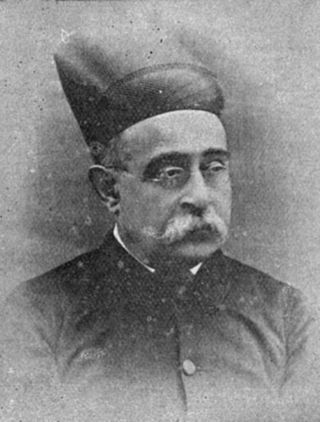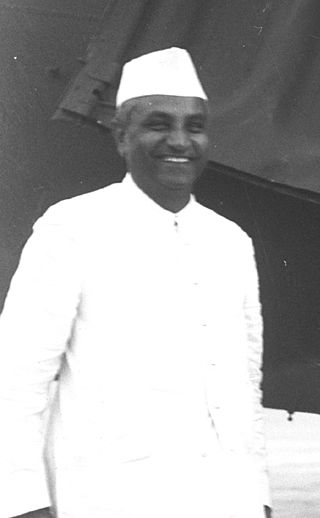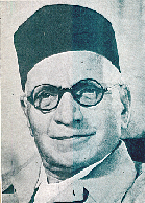
Sarojini Naidu was an Indian political activist and poet who served as the first Governor of United Provinces, after India's independence. She played an important role in the Indian independence movement against the British Raj. She was the first Indian woman to be president of the Indian National Congress and appointed governor of a state.

Elphinstone College is one of the constituent colleges of Dr. Homi Bhabha State University, a state cluster university. Established in 1856, it is one of the oldest colleges in Mumbai. It played a major role in shaping and developing the educational landscape of the city. It also played a pivotal role in the inception of the University of Mumbai.

Sir Pherozeshah Merwanjee Mehta was an Indian politician and lawyer from Bombay. He was knighted by the British Government in India for his service to the law. He became the Municipal commissioner of Bombay Municipality in 1873 and its president four times – 1884, 1885, 1905 and 1911. Mehta was one of the founding members and President of the Indian National Congress in 1890 held at Calcutta.

The British Raj was the rule of the British Crown on the Indian subcontinent, lasting from 1858 to 1947. It is also called Crown rule in India, or Direct rule in India. The region under British control was commonly called India in contemporaneous usage and included areas directly administered by the United Kingdom, which were collectively called British India, and areas ruled by indigenous rulers, but under British paramountcy, called the princely states. The region was sometimes called the Indian Empire, though not officially.
The Caucus Case was a court case handled by Muhammad Ali Jinnah at the behest of Sir Pherozeshah Mehta at the Bombay High Court in 1905. He won the case and emerged as an outstanding lawyer in India.

Sir Dinshaw Edulji Wacha was a Parsi politician from Bombay (Mumbai). He was one of the founding members of the Indian National Congress. Wacha was also the president of the Congress in 1901.

Ganapathy Dikshitar Subramania Iyer was a leading Indian journalist, social reformer and freedom fighter who led the Triplicane Six in launching The Hindu, an English newspaper on 20 September 1878. He was proprietor, editor and managing director of The Hindu from 20 September 1878 to October 1898. The Tamil language newspaper 'Swadesamitran' was also founded by him in 1891.
Gaganvihari Lallubhai Mehta was the ambassador of India to the United States from 1952 to 1958.

Jivraj Narayan Mehta was an Indian politician and the first Chief Minister of Gujarat. He also served as the first "Dewan" of the erstwhile Baroda state, and Indian high commissioner to the United Kingdom from 1963 to 1966.

Mukund Ramrao Jayakar was an Indian Lawyer, scholar and politician. He was the first Vice-Chancellor of the University of Poona. He was also a prominent freedom fighter.
Free Press of India was an Indian nationalist-supporting news agency founded in the 1920s by Swaminathan Sadanand, during the period of the British Raj. It was the first news agency owned and managed by Indians. Beset by dubious business acumen from the outset, and beholden to those who financed it, the agency failed to obtain substantial support from Indian-owned press and hence closed down in 1935. It was revived briefly between 1945 and 1947 before being stifled by the government of the newly independent country. It was at various times a supporter of the Swaraj Party and, later, of the Responsive Cooperation Party, as well as various business interests.
Sir Hormasji Pherozeshah Mody KBE, generally known as Sir Homi Mody was a noted Parsi businessman associated with Tata Group and an administrator of India.

Benjamin Guy Horniman was a British-Indian journalist and editor of The Bombay Chronicle, particularly notable for his support of Indian independence.
The BombayGazette was among the first English newspapers published from Bombay, India.
Sir Frank Clement Offley Beaman (1858–1928), styled Mr Justice Beaman, was a puisne judge in the High Court, Bombay.
Jehangir Bomanji Petit was a noted nationalist, mill owner, philanthropist, and one of Mahatma Gandhi's earliest supporters.
The Advocate-General of Bombay was charged with advising the Government of the British administered Bombay Presidency on legal matters. The Presidency existed from 1668 to 1947. Prior to 1858, when it was administered by the East India Company, the Advocate-General was the senior law officer of that company and also the Attorney-General of the Sovereign of Great Britain. He was an ex-officio member of the Legislative Council.

Hoosenally Rahimtoola was a Legislator of the Bombay Presidency. He remained Mayor of Bombay from 1934 to 1935 and was Minister in the Provincial Government briefly in 1937. Rahimtoola was also President of the Bombay Legislative Council during 1936.
The Women's suffrage movement in India fought for Indian women's right to political enfranchisement in Colonial India under British rule. Beyond suffrage, the movement was fighting for women's right to stand for and hold office during the colonial era. In 1918, when Britain granted limited suffrage to women property holders, the law did not apply to British citizens in other parts of the Empire. Despite petitions presented by women and men to the British commissions sent to evaluate Indian voting regulations, women's demands were ignored in the Montagu–Chelmsford Reforms. In 1919, impassioned pleas and reports indicating support for women to have the vote were presented by suffragists to the India Office and before the Joint Select Committee of the House of Lords and Commons, who were meeting to finalize the electoral regulation reforms of the Southborough Franchise Committee. Though they were not granted voting rights, nor the right to stand in elections, the Government of India Act 1919 allowed Provincial Councils to determine if women could vote, provided they met stringent property, income, or educational levels.

S. Srinivasiyengar Setlur, widely known as S. S. Setlur, was an Indian lawyer, judge, journalist, and freedom fighter. As a lawyer in Bombay, Setlur was a close associate of Bal Gangadhar Tilak and served as the Bombay correspondent for The Hindu. He was later a justice of the Chief Court of Mysore and went on to found the Congress party in Mysore state, serving as its first president.










